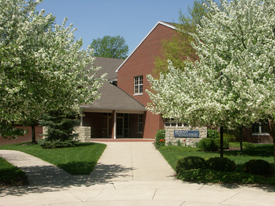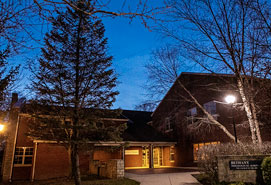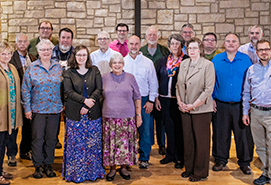Seeking Racial Justice

Bethany Theological Seminary is continuing its multifaceted efforts to pursue racial justice. The foundation of this work is a framework created in 2019 which was designed to intentionally confront racial hierarchy, implicit bias, and systemic racism. This approach grew out of the Seminary’s Strategic Vision Implementation Plan goal “to promote cultural, racial, and theological diversity throughout the institution.”
This goal has prompted formal reviews of policies, human resources, hiring practices, and curriculum. The Seminary has sought the council of outside experts to review current approaches and devise improved guidelines in each of these areas.
“Bethany is involving our entire community in our effort to combat racism and seek a more just world,” notes President Jeff Carter. “We are examining and transforming our current practices, engaging in the sacred work of racial justice and peace making, and embracing God’s prophetic call to confront the evils of racism. This work connects on an elemental level with our mission: we seek to educate a generation of leaders who are equipped to listen to the needs of the world and to confront their own biases. What could be more essential at this moment of division and strife?”
Bethany’s Board of Trustees has issued the following statement in support of the Seminary’s anti-racism efforts:
“As Children of God, we join with others to pursue the path of righteousness in the midst of social turmoil. We humbly and fully commit ourselves as members of the Bethany Theological Seminary Board of Trustees to stand against all forms of racism, discrimination, bias, privilege, abusive power, colonialism, and racial hierarchy. We recognize these insidious elements are pervasive on individual, interpersonal, institutional, and systemic levels. We also grieve the ugly and harmful mental, physical, spiritual, educational, social, economic, ecological, and societal effects these foundations impose upon our human family.
To this end, we are dedicated to eliminating all such structures in this Seminary and working to uphold justice, equity, diversity, interconnectedness, and accessibility. In doing so, we fully acknowledge and accept that this journey will require us as individuals and as a collective Board to be faithfully and consistently committed to seeking God’s will in the ways and spirit of Jesus, Our Lord and Savior. We also understand that our work will be challenging, uncomfortable, and painful but, in doing so, remain resolved that all facets of our Bethany learning community—including this Board—will become transformed into new and greater instruments through our efforts to fulfill the Seminary’s mission so that the world flourishes. It is in this spirit that we call upon our entire Bethany family to join us as we, together, strive to address this vital charge.
It is our hope and prayer for God to act in and through us as we intentionally work to fulfill this important and necessary calling. With humble hearts, may we always be reminded that sincere dedication to hope, continued learning, self-examination, and evaluation will be integral to our efforts, and that there is no ending to this journey. And, with Jesus as our example and inspiration, may our efforts as a Board contribute in positive ways that bring about a new and beloved community at Bethany Theological Seminary.”
The Seminary received a $50,000 grant through the Lilly Endowment’s Pathways for Tomorrow initiative. This funding allowed Bethany to engage with external consultants and conversation partners with a goal of making structural changes that will bolster the racial justice goals.
In addition, Bethany is enthusiastically pursuing new partnerships with the University of LaVerne (California), New Brunswick Theological Seminary (New Jersey), and Reid Temple AME Church (Washington, D.C.), to create new opportunities for a more diverse group of students to study together, and to share institutional resources and expertise. The Seminary remains committed to providing students with more opportunities to step out of their comfort zones and form relationships with individuals with backgrounds and perspectives different from their own.
“These new initiatives come in response to a need expressed by current students to help our predominantly rural and white student body to learn from interactions with, and forge connections to, diverse communities,” says Carter. “This will ultimately strengthen the educational experience we offer to students — so that the world flourishes.”








 Green Circle: Bethany invests in 100% renewable energy.
Green Circle: Bethany invests in 100% renewable energy.